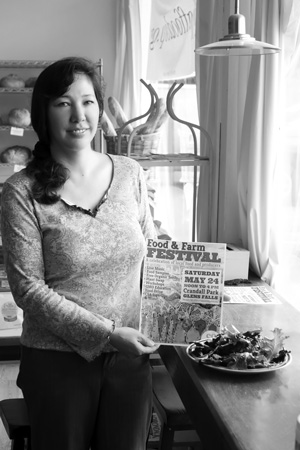News
Taking a stand for unadulterated food
May 24 festival is local observance of global anti-GMO event
By STACEY MORRIS
Contributing writer
Joan K. Lentini photo
GLENS FALLS, N.Y.
When Sue Duncan decided to spearhead this year’s March Against Monsanto in Glens Falls, she decided to fight the infamous corporate agribusiness giant not with a line of protesters, but with good food.
On May 24, a day chosen by concerned citizens around the globe to voice disapproval of the corporation’s role in producing genetically modified crops, many people will take the day’s title literally and take to the streets to march. In Glens Falls, however, Duncan says the day will be observed with a gathering in the city’s largest park that includes plenty of non-GMO food, live music, speakers, and heaping helpings of information.
“There will be marches in 400 cities in 47 states,” said Duncan, the vice president of the Glens Falls Food Co-op, which is sponsoring the local event. Worldwide, the day will be marked by events in 52 countries across six continents.
At the center of the storm is Monsanto, a chemical company headquartered in Missouri that has become the largest producer of GMOs, or genetically modified organisms. Critics say the company’s resume also includes the production of Agent Orange, DDT, Aspartame and a number of other controversial pesticides and preservatives.
“They also control 40 percent of the seed companies” in the United States, Duncan said. “So we have a chemical company now controlling a large amount of seed companies. … Put that together, and what do you get?”
Duncan, a mother of four who lives in Queensbury, said the goal of the May 24 Farm and Food Festival is to raise awareness about GMOs and “what’s going on with our food supply.”
“We go to the grocery store and think we are buying food that is natural and healthy,” she said. “But approximately 90 percent of corn, soy, sugar beets and other vegetables, such as zucchini and papaya, are genetically modified in the U.S., which means their DNA has been changed in a lab.”
Opposing corporate food
The genetically altered crops produced by Monsanto typically are engineered to withstand large applications of agricultural chemicals such as the herbicide Roundup, which is also manufactured by Monsanto. The result is crops that are easier for farmers to grow but that result in other environmental costs – and, Duncan and others believe, risks to human health.
Although the U.S. Food and Drug Administration contends there is no substantive difference between crops that are genetically altered and those that aren’t, Monsanto’s critics say not enough is known about the long-term health effects of consuming genetically modified foods.
Duncan said studies have linked GMOs to diseases and disorders ranging from autism to gastroenteritis, leukemia and infertility.
“There’s also a sharp rise in food allergies,” she said. “I believe genetically modified foods are related to a lot of different maladies, and people aren’t aware it’s affecting them in certain ways.”
Matt Funiciello, the Green Party candidate in this year’s race to represent New York’s 21st Congressional District, is scheduled to speak at the May 24 event. Funiciello owns Rock Hill Bakehouse, which produces artisan breads and runs a café in Glens Falls. The bakery also donates space for the Glens Falls Food Co-op at its store in Moreau.
Funiciello said he’ll be talking about his support for locally produced and organic foods.
“I’ve evolved in my purchasing habits,” Funiciello said. “Buying local and regional wheat for Rock Hill Bakehouse were huge moves forward for me.”
He said he’ll also be addressing what he sees as questionable government practices regarding food policy.
“I’m inspired by how our farmers markets have flourished, but one of the reasons I’m running for Congress is that some of the government’s bills and regulations are made to inhibit micro-economies that allow for healthy, regional food,” Funiciello said. “Monsanto is the McDonald’s of farming, and we point to them as the great evil, but the reality is they’re one of many. We’re in an odd time when our first lady is planting an organic garden at the White House as her husband appoints Tom Vilsack secretary of agriculture, and he has major ties to not only Monsanto but GMOs in general.”
Learning from experience
Duncan said she became concerned about genetically modified foods several years ago as she raised her children and cared for her elderly mother.
“I was feeding a lot of people and wanted to make sure the foods I was feeding them were healthy, so I started studying the issue,” she said.
Her research did more than just steer the family away from GMO-laden foods; it revealed that two of her children suffered from food intolerances.
“We didn’t understand why they were having issues with stomach upset and poor digestion,” Duncan said. “One day my daughter decided to go wheat-free, and her world changed -- just from eliminating wheat. Her stomach upset disappeared, and the brain fog lifted. It really got me thinking about the effect certain foods have on our health. It’s not anything to be taken lightly.”
She said she would like to see a moratorium on GMO cultivation, pending further independent research into the health effects of human consumption of engineered crops. She’d also like more studies of the crops’ environmental effects.
“In the meantime, GMOs should be labeled,” Duncan said. “If we have to start small, we can encourage our grocery stores by demanding GMO labeling.”
The Whole Foods supermarket chain has pledged to require its suppliers, by later in the decade, to label foods containing genetically modified ingredients.
And last month, state legislators in Vermont passed a bill that would make the state the first to require labeling of genetically modified foods – a move that many believe will set the stage for a legal challenge by big food companies.
Duncan said New York’s legislators should follow Vermont’s lead.
Going positive
In October, as part of an earlier March Against Monsanto event, Duncan and other protesters turned out at City Park in downtown Glens Falls.
“It was a small turnout but a good one,” she recalled. “People came from as far away as Amsterdam and Connecticut, and we talked to a number of people who didn’t know what GMOs are or who Monsanto is. … I was surprised that there weren’t more local supporters, but looking back, if we’d done more planning, we probably would have had more of the community involved.”
Duncan said that for the sake of reaching a wider audience, she decided to change the name of this spring’s event.
“Although this is a global event happening in over 400 cities, I realized the name itself may not be appealing, so I decided to localize it and turn it into a celebration of local businesses, farmers and food producers who support organic, sustainable and non-GMO foods,” she said. “We feel the change to the Food and Farm Festival evokes positivity about how, supporting local and organic food, we can turn the tide from chemically processed, laboratory-made ‘food’ and go back to the tradition of real food.”
Although Duncan said she hopes all segments of the community turn out on May 24, she hopes to reach one group in particular: the uninformed.
“A lot of people know about GMOs and just don’t care,” she said. “Then there are people like me and the other organizers who are aware and want to let others know. And a great many people just don’t know about the GMO issue – and that’s the group we’re trying to reach.”
Duncan said she hopes participants in the May 24 food festival come away with greater knowledge – both about GMOs and healthier food options.
“When it comes to labels, the more ingredients a food has, the more likely the worse it is for you, unless all the ingredients are organic,” she said. “Unless something is labeled organic, it likely has genetically modified ingredients. Even in things like sour cream, I was finding modified cornstarch. … Shouldn’t sour cream just be cream?”
Local businesses and organizations that were expected to take part as of late April included Rock Hill, the Northeast Organic Farming Association, The Shirt Factory, Adirondack Natural Foods, Tierra Farms, Gatherer’s Granola, Yummy Mommy Bakery, Transition Towns, Adirondack Bucks (an area bartering organization), Café Rue 46, Cherish Natural Soap, the Glens Falls Farmers Market Association, Kilpatrick Family Farm, Fortsville Creek Farm, and the Community Gardens of Glens Falls. The local Boy Scouts organization will provide bottled water.
The Farm and Food Festival, Glens Falls’ version of the March Against Monsanto, will take place at noon Saturday, May 24, at Crandall Park on Glen Street. Area restaurants, retailers and farmers will be on hand offering information and food samples. Shares of community-supported farms will be available for purchase. The guest speaker at the event is Matt Funiciello, the owner of Rock Hill Bakehouse and the Green Party candidate for U.S. representative in New York’s 21st Congressional District; he speaks at 1 p.m. Organizers are seeking donations of non-GMO foods that will be given to Community Action of Glens Falls. For more information visit https://www.facebook.com/events/562974397131334/

